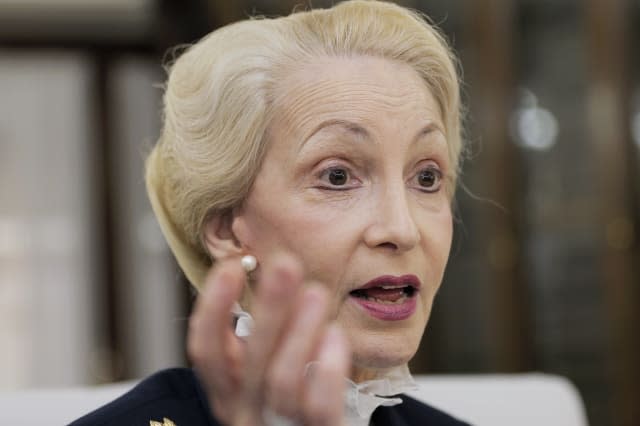Women shouldn't take maternity leave: it destroys their career

Lady Barbara Judge, the first female chair of the Institute of Directors, has said that after having a baby, women should get themselves a nanny, and get back into the workplace immediately. If they take the year of maternity leave they are entitled to, it will destroy their career. She has received support from some quarters and condemnation from others.
Judge, a 69-year-old lawyer, took 12 days off work after her son was born, because she believes taking more would have been bad for her, and would have damaged her career. She told a conference for women in finance that in the early days of childcare, the job is mind-numbingly unchallenging enough to leave to a nanny. She said: "When you have to be there is when the child gets smarter than the nanny."
She used the example of a friend of hers who took a year off to spend time with her baby, and when she returned to work she was made redundant, because the business realised it could do fine without her.
Is she right?
Judge has received some support. Ben Black, director of My Family Care, which provides childcare support to businesses, told The Telegraph: "Of course maternity leave damages your career. It would be crazy to think it doesn't... And yes, the longer the leave, the bigger the damage. If you have a year out, you're a year behind when you come back."
The figures back her up too. Data analysed by the House of Commons library last year found that 50,000 of the 340,000 women who take maternity leave each year find their job is threatened as a result.
Judge argues that this is the reality of the workplace, so women must be realistic, fit in with the requirements of their boss, and use childcare to make it possible. However, not everyone agrees. Abi Wood, head of campaigns at parenting charity, NCT, said: "In the early weeks its really important for women to physically recover from birth and bond with their baby who will be changing every day."
There are parents who argue that giving their children an emotional grounding in the early months is important enough to put their job on hold for a short period of time. Wood adds: "A woman having a baby aged 30 is likely to work another 40 years beyond this, so a year is actually a very short amount of time and shouldn't make too much of a difference over someone's whole career."
It's a reasonable argument. After-all, how many parents tell their teenage kids that they cannot possibly have a year out before university, because they'll be 'a year behind'?
Wood's point isn't that every mother should stay at home for a year with their baby, but that everyone should be free to make the decision that's right for them. She adds: "It is important that parents have a choice and that they are not told what to do, as everyone is different."
Missing the point?
Interestingly, much of the debate is focusing on the first year of a child's life, which is essentially missing the point.
If the first year of being a parent was the main concern, then the debate isn't worth having. Either Judge is wrong, and women should take their year off if they want to, because it's their right and they may feel it's the best approach. Alternatively, Judge is right and taking a year off means losing your job. However, this isn't necessarily the end of the world. If you have the skills and abilities, and all an employer is concerned about is the first year of parenthood, then you'll easily walk into a new role.
The fact is that it's not just the first year that affects parents. It's not just the pre-school years either: childcare is an issue for your offspring's entire childhood. Parents have to make a decision how much they feel they need to be around, how much flexibility they need at work in order to cover things like sickness, and whether they can take a job that involves travel and leaving their children overnight.
In some families, both parents work extremely hard forging vital careers, and employ childcare services of one kind or another. In some families, women will assume responsibility for these roles, and will scale back their careers. In a very small proportion of cases men will take the lead on childcare.
It's no surprise that studies into the gender pay gap show that there's no difference between what men and women earn when they first start work. It's only after women reach typical child-rearing age that the gap opens. This has a great deal to do with the fact that mothers often need flexibility in their working life and pay an enormous price for it in their careers.
If we want families to be able to make the most appropriate decisions for themselves, without feeling they have to pay the price of sacrificing their career or time with their children, then perhaps the question we ought to be asking is why flexibility has to be such an expensive commodity.
Until such flexibility is built into the workplace, and offered to everyone, regardless of their parental responsibilities, then it doesn't matter whether parents take 12 days or 12 months parental leave, they're going to pay the price of having kids one way or another for the next 18 years.
But what do you think? Let us know in the comments.



